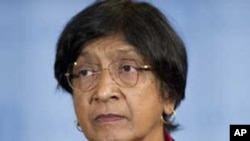The United Nations human rights chief said Monday she is outraged by what she called the Syrian government’s serious violations of civilian rights.
The U.N. High Commissioner for Human Rights, Navi Pillay, told the General Assembly she is very distressed that the continued ruthless repression and deliberate stirring of sectarian tensions in Syria might soon plunge the country into civil war. She said the failure of the Security Council to agree on firm collective action appears to have emboldened the Syrian government to launch an all-out assault in an effort to crush dissent with overwhelming force.
On February 4, Russia and China vetoed a Security Council resolution that would have endorsed an Arab League plan for Syrian President Bashar al-Assad to step down. The General Assembly is considering a similar resolution. Although General Assembly resolutions cannot be vetoed by any country, they do not carry the same force as resolutions adopted by the Security Council.
In her remarks to the General Assembly, Pillay said the nature and scale of human rights abuses committed by Syrian forces indicate that crimes against humanity are likely to have been committed.
“Independent, credible and corroborated accounts indicate that these abuses have taken place as part of a widespread and systematic attack on civilians,” Pillay said.
The U.N. human rights chief says the attacks indicate approval or complicity of Syrian authorities at the highest levels. She said it is urgent that the international community act to protect the Syrian people.
Syria’s representative at the United Nations, Bashar Ja’afari, objected to the General Assembly meeting to discuss rights violations in his country. He blamed the violence in Syria on those who, he said, are attempting to obtain political interests by using Syrian blood as currency.
“And I would say to those: 'stop killing my people. Stop your plots against Syria. Help the Syrian people; help the Syrian government to combat terrorism,'” Ja’afari said.
Russian Ambassador Vitaly Churkin said the Arab League’s new proposal for a peacekeeping force in Syria requires careful consideration. But he added that a peacekeeping mission requires, first, a ceasefire. He said armed groups opposing the government do not answer to anyone.
U.S. Ambassador Rosemary DiCarlo called the information provided by the U.N. human rights chief deeply disturbing.
"It confirms, yet again, that the Assad regime is in blatant defiance of its commitments to the action plan it agreed to with the League of Arab States and its obligations under international law,” Dicarlo said.
DiCarlo said the United States supports the Syrian people’s demand for a unified Syria with a democratic, representative and inclusive government that respects human rights and fundamental freedoms.
| Join the conversation on our social journalism site - Middle East Voices. Follow our Middle East reports on Twitter and discuss them on our Facebook page. |




